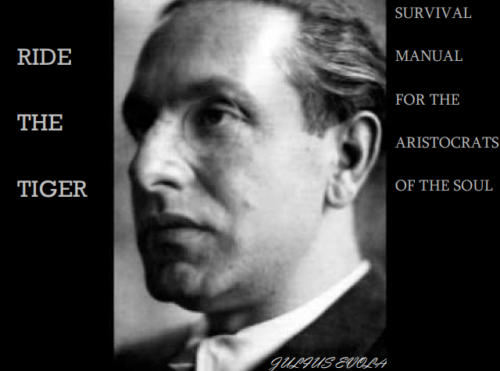
This reading continues on from here.
Part Five of Ride The Tiger is called ‘Dissolution of Consciousness and Relativism’ and is comprised of two essays.
The first of these is called ‘The Procedures of Modern Science’. Here Evola begins by describing how the Western idea of Western supremacy upholds itself by appeal to its achievements in materialist science. Evola thinks that this is a gross error, and goes as far as to say that “None οf modern science has the slightest value as knowledge.” It is concerned with statistics and probability rather than truth.
The cult of scientific objectivity that Evola decries is all too willing to discard currently-held theories in favour of ones that, if adopted, provide temporary gains in terms of political power. This supposed objectivity, instead of leading to ever-refining truth, has merely caused science to lose itself chasing shadows. Einstein’s theory of relativity comes in for special criticism, being notable only for producing the bomb.
Scientism has only led to a kind of cult of quantity, which has made people obsessed with numbers and formulas and abstractions, so that we have forgotten what reality actually is and what it’s about. It’s a false logic, and it’s grossly unsuitable for anyone with spiritual pretensions.
The twentieth essay is called ‘Covering Up Nature – Phenomenology’ and continues the theme of the inadequacy of the scientific culture. Science hasn’t really got us any closer to the nature of reality, and each new “advance” merely takes us further away. After all, the world of our actual experience is still made up of fire, air, earth and water, and mathematical abstractions tell us nothing about how to deal with these.
Modern man is destructive because scientism has conditioned him to see everything as soulless. Our compulsory education system brainwashes children with this perspective from when they are very small. Even worse is the popular delusion that science can replace religion in the sense that it might give humanity a promised path to future happiness. This delusion has caused much misery.
Alchemically, this essay continues the theme of decrying the men of silver, whose preoccupations have not and can not lead to spiritual absolution. Evola gives credit to the concerns of the men of silver in so far as the discipline of mathematics cultivates clarity of thought, but all of these intellectualisms ignore the spiritual. Once one has seen the “great illusion” it’s apparent that science cannot be sufficient to solve human needs.
The twenty-first essay is called ‘Sickness and the European Culture’ and comes back to the subject of European decadence. This essay is very short, at only three pages.
Here Evola reinforces the contention that European culture has become sick because it has lost its spiritual centre. With no shared sense of spiritual tradition, the forces holding society together have weakened, and some parts of it have broken away. The tragedy of World War II is considered a natural consequence of this process of technical and scientific advancement at the expense of spiritual knowledge.
Part of the problem, Evola holds, is that politics has become separated from an intellectual and cultural class that, in its conceit, has decided it’s above the political. This is not the fault of that class so much as it is a symptom of the collapse of the unifying, transcendent and spiritual ideas that lie underneath cultural expressions such as politics and the arts.
*
If you enjoyed reading this essay, you can get a compilation of the Best VJMP Essays and Articles of 2017 from Amazon for Kindle or Amazon for CreateSpace (for international readers), or TradeMe (for Kiwis).
